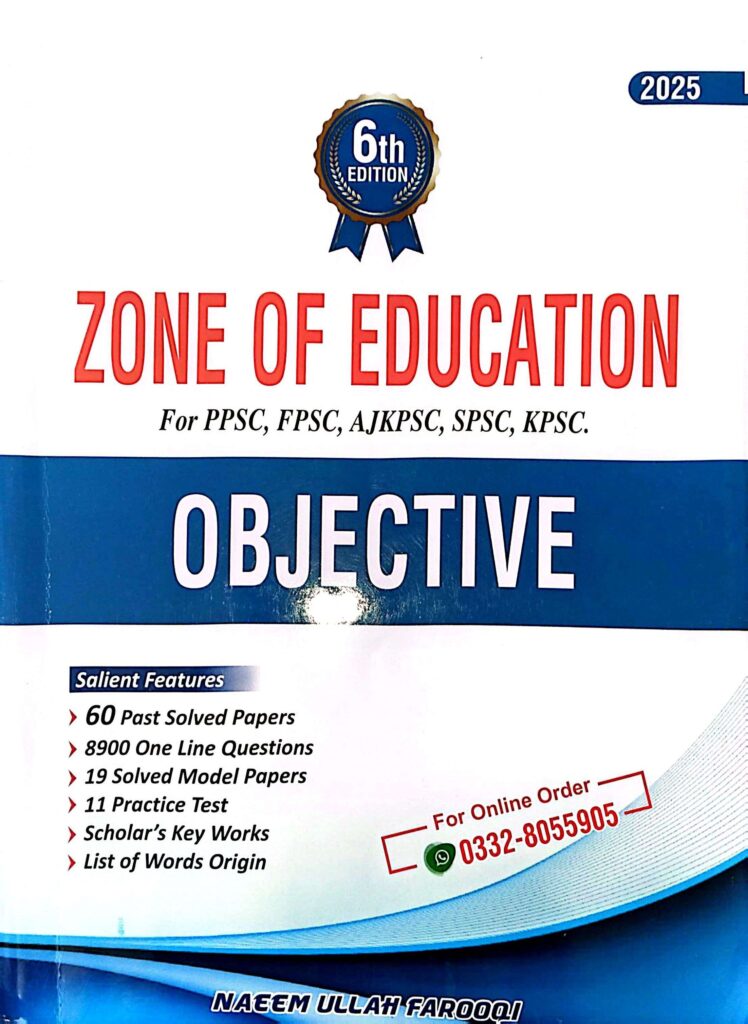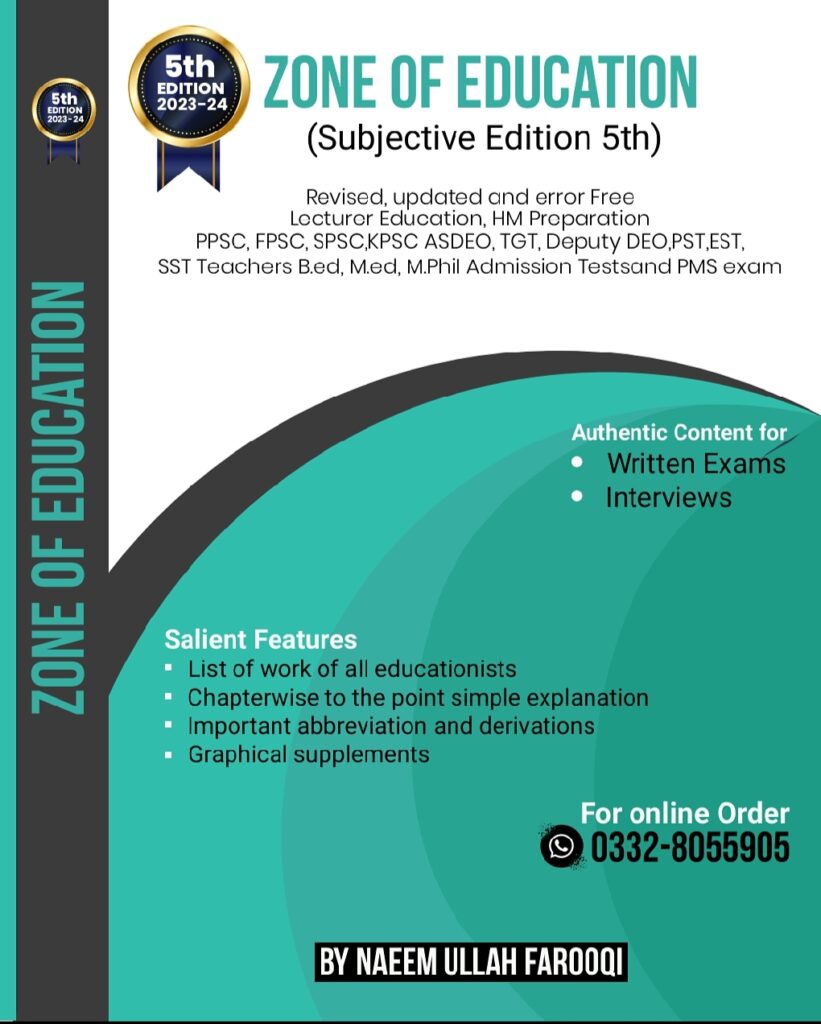PAST PAPER 18 (HEADMASTER/HEADMISTRESS) AJKPSC
01. Education is a process through which a_____ transmit its collected excellence to the next generations:
a) Society b) Individual
c) Group d) None
02. Who said “Education is the process of development of the mind and the body of man so that he/ she eagerly pursues the ideal perfection of citizenship”:
a) Allama Iqbal b) Socrates
c) Ibne -Rushed d) Plato
03._______ education is the process of training & development of the abilities of individuals in a certified program:
a) Formal b) Informal
c) Both of these d) None of these
04. ______education refers to the education, which is conducted in formal educational institutions for the achievement of pre-determined goals:
a) Formal b) Informal
c) Both of these d) None of these
05. ______education refers to the education, which happens outside of the context of a formal structured educational institution:
a) Formal b) Non-formal
c) Informal d) None of these
06. A ______ stresses the self-realization aspects of education:
a) Moralist b) Spiritualist
c) Both of these d) None of these
07. The epistemological concepts of Al-Gazali is found in his famous book “Ihya Ul-Umid-Din” which in English means:
a) Aims of education
b) Revival of Fiqh
c) The Regeneration of sciences d) None of these
§ revival of religious science
08. Ibn-e-Khaldun said, the revealed knowledge is the real knowledge. It is the concept of:
a) Epistemology b) Ontology c) Axiology d) None of these
09. The chief source for the accomplishments of the aim of education is:
a) Teacher b) Curriculum
c) Method of teaching d) Evaluation
10. Examinations are linked with:
a) Formal Education
b) Informal Education
c) Semi-formal Education
d) Both A & B
11. Through the process of educational evaluation the educationist:
a) Rearrange the instructional content b) Rearrange the methods of teaching
c) Rearrange the instructional content & methods of teaching
d) None of these
12. The process of the curriculum is:
a) Dynamic b) Traditional
c) Non flexible d) Non-dynamic
13. The word “Curriculum” has been derived from the Latin word:
a) Currium b) Courier
c) Courium d) None of these
14. In the process of curriculum development the first step is:
a) The selection or method of teaching b) The determination of aim
c) The selection of curricular content
d) The selection of the modes of evaluation
15. E.L Thorndike is a famous for:
a) Lesson making
b) Scientific investigation
c) Drill upon learning
d) None of these
16. Theory of “Anxiety” is related to”
a) Freud b) Maslow
c) Miller d) None of these
17. Who developed the curriculum of Dars-e-Nazami?
a) Aurangzeb
b) Shah Wali-u-Allah
c) Fath-u-Allah Sherazi
d) Mulla Nazaim-ud-Din Sahalvi
18. Which of the following was the chief concern of Dars –e- Nizami curriculum?
a) Quran b) Hadith
c) Mathematics d) Philosophy
19. Who established Madrasa Nizamia of Baghdad?
a) Walid Bin Abdual Malik
b) Nazam ul Mulik
c) Haroon Rasheed
d) Mamoon Rasheed
20. Due to the efforts for educating the people in the period of the Holy Prophet (P.B.U.H):
a) One-fourth of the population became literate
b) Three-fourths of the population became literate
c) More than half of the population became literate
d) The whole half of the population became literate
21. According to Ibn-e-Khaldun the fountainhead of revealed knowledge is:
a) Quran b) Jurisprudence c) Mathematics d) Logic
22. The concept of prohibited knowledge was presented by:
a) Sir Syed Ahmad b) Ibn-e-Khaldun
c) Al Ghazali d) Rousseau
23. Who said “Instruction in foreign language is half instruction”?
a) John Dewy b) Pestalozzi
c) Al Ghazali d) Ibn-e-Khaldun
24. Avicenna’s book “Al Shifa “deals with:
a) Chemistry b) Mathematics
c) Biology d) All of these
25: Avicenna has divided knowledge into:
a) Three broad categories
b) Four broad categories
c) Five broad categories
d) Six broad categories
26. According to Avicenna, the advance sciences:
a) Have no concern with matter b) Have direct concern with matter
c) Have no concern with wisdom d) None of these
27. Which of the following stage of the life is the most appropriate for learning near Zarnogi
a) Boyhood
b) Neo-adolescence
c) Adolescence
d) Neo-adolescence & adolescence
28. Which of the following timing is appropriate for learning near Zarnogi
a) After evening
b) After deep evening
c) Before dawn
d) Morning
29. Zarnogi holds that writing of two letters with understanding is better than:
a) Memorization of two big books
b) Memorization of three big books
c) Memorization of four big books
d) Memorization of a whole book
30. Who holds the sixth sense is a supervisor form of intellect?
a) Al Ghazali b) Khaldun
c) Avicenna d) Zarnogi
31. The medium of instruction in elementary & secondary education in the Islamic schools of the subcontinent was:
a) Arabic b) Persian c) Urdu d) Hindi
32: which of the following principles of curriculum development was adopted by Mulla Nizam-ud-Din Sahalvi?
a) Difficult books on various academic disciplines should be studied
b) The books acceptable for the people belonging to the different religious sets
c) Increasing the academic level of the students by studying the masterpiece books on various disciplines
d) The books based on the revealed knowledge should be studied by the students
33. Dars-e-Nizami was lunched in
a) The age of the emperor Akbar
b) The age of the emperor Jahangir
c) The age of the emperor Hamayun
d) The age of the emperor Aurangzeb
§ According to our research its answer is Ahmad shah (1748-1754) as Darse nizami was presented by Mulla Nizam ud din in 1748 he was son of Mulla Qut bud din who was real founder of Darse nizami
JOIN ZONE OF EDUCATIONPK!
Discover the most comprehensive and reliable pedagogy resources in Pakistan, curated for competitive exam success. Our content covers all competitive exam MCQs, including PPSC, FPSC, AJKPSC, SPSC, and more. Designed to empower learners with top-notch material and insights, trust us for your preparation journey!


